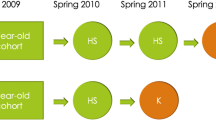Abstract
Research suggests that many typically developing children in the United States experience problems during the transition from preschool to kindergarten. Despite the fact that early school experiences impact educational trajectories, few empirical studies investigate the effect of kindergarten preparation variables on child outcomes. The primary purpose of this study was to investigate the relation between kindergarten preparation variables, including early education experiences and family involvement in preparation activities, and children’s socio-behavioral outcomes in kindergarten. Participants included 86 general education students, their parents, and teachers. Data collection involved parent reports of child and family demographic information and behavioral involvement in kindergarten preparation activities as well as assessment of teacher-reported child outcomes, including student-teacher relationships, social skills, and problem behavior. Kindergarten preparation variables, particularly early education experience, significantly predicted kindergarten student-teacher relationship quality and school problem behavior, after accounting for the effects of district locale, family socio-economic status, and parent-reported problem behavior. The importance of preparation activities for supporting child socio-behavioral adjustment in kindergarten is discussed.
Similar content being viewed by others
References
Belsky, J., & MacKinnon, C. (1994). Transition to school: Developmental trajectories and school experiences. Early Education and Development, 5, 106–119.
Desimone, L., Payne, B., Fedoravicius, N., Henrich, C., & Finn-Stevenson, M. (2004). Comprehensive school reform: An implementation study of preschool programs in elementary schools. Elementary School Journal, 104, 369–389.
Eckert, T. L., McIntyre, L. L., DiGennaro, F. D., Arbolino, L., Begeny, J., & Perry, L. J. (2008). Researching the transition to kindergarten for typically developing children: A literature review of current processes, practices, and programs. In D. H. Molina (Ed.), School psychology: Twenty-first century issues and challenges (pp. 235–252). Hauppauge, NY: Nova Science Publishers.
Entwisle, D., & Alexander, K. (1999). Early schooling and social stratification. In R. C. Pianta & M. J. Cox (Eds.), The transition to kindergarten (pp. 13–38). Baltimore, MD: Paul H. Brookes Publishing.
Gresham, F. M., & Elliott, S. N. (1990). Social skills rating system manual. Circle Pines, MN: American Guidance Service.
LoCasale-Crouch, J., Mashburn, A., Downer, J., & Pianta, R. (2008). Pre-kindergarten teachers’ use of transition practices and children’s adjustment in kindergarten. Early Childhood Research Quarterly, 23, 124–139.
McIntyre, L. L., Blacher, J., & Baker, B. L. (2006). The transition to school: Adaptation in young children with and without intellectual disability. Journal of Intellectual Disability Research, 50, 349–361.
McIntyre, L. L., Eckert, T. L., Fiese, B. H., DiGennaro, F. D., & Wildenger, L. K. (2007). The transition to kindergarten: Family experiences and involvement. Early Childhood Education Journal, 35, 83–88.
New York State Education Department: Elementary, Middle, Secondary, and Continuing Education. (2008, January 3). UPK Regulations. Retrieved July 26, 2010, from http://www.emsc.nysed.gov/upk/regulations.html.
NICHD Early Child Care Research Network. (1999). Child outcomes when child care center classes meet recommended standards for quality. American Journal of Public Health, 89, 1072–1077.
NICHD Early Child Care Research Network. (2000). The relation of child care to cognitive and language development. Child Development, 71, 960–980.
NICHD Early Child Care Research Network. (2002). Early child care and children’s development prior to school entry: Results from the NICHD study of early child care. American Educational Research Journal, 39, 133–164.
NICHD Early Child Care Research Network. (2005). Characteristics and quality of child care for toddlers and preschoolers. In NICHD Early Child Care Research Network (Ed.), Child care and child development: Results from the NICHD study of early child care and youth development (pp. 91–102). Guilford Press: New York.
Pianta, R. (2001). Student-teacher relationship scale (STRS): professional manual. Lutz, FL: Psychological Assessment Resources.
Pianta, R., Cox, M., Taylor, L., & Early, D. (1999). Kindergarten teachers’ practices related to the transition to school: Results of a national survey. Elementary School Journal, 100, 71–86.
Pianta, R., & Kraft-Sayre, M. (2003). Successful kindergarten transition. Baltimore, MD: Paul H. Brookes Publishing Co.
Pianta, R., Kraft-Sayre, M., Rimm-Kaufman, S., Gercke, N., & Higgins, T. (2001). Collaboration in building partnerships between families and schools: The national center for early development and learning’s kindergarten transition intervention. Early Childhood Research Quarterly, 16, 117–132.
Rimm-Kaufman, S., & Pianta, R. (2000). An ecological perspective on the transition to kindergarten: A theoretical framework to guide empirical research. Journal of Applied Developmental Psychology, 21, 491–511.
Rimm-Kaufman, S., Pianta, R., & Cox, M. (2000). Teachers’ judgments of problems in the transition to kindergarten. Early Childhood Research Quarterly, 15, 147–166.
Schulting, A., Malone, P., & Dodge, K. (2005). The effect of school-based kindergarten transition policies and practices on child academic outcomes. Developmental Psychology, 41, 860–871.
SPSS for Windows. Rel. 15.0.0. 2006. Chicago: SPSS.
US Department of Education, National Center for Education Statistics. (2007). The condition of education 2007 (NCES 2007–064). Washington, DC: US Government Printing Office.
Author information
Authors and Affiliations
Corresponding author
Rights and permissions
About this article
Cite this article
Wildenger, L.K., McIntyre, L.L. Investigating the Relation Between Kindergarten Preparation and Child Socio-Behavioral School Outcomes. Early Childhood Educ J 40, 169–176 (2012). https://doi.org/10.1007/s10643-012-0509-x
Published:
Issue Date:
DOI: https://doi.org/10.1007/s10643-012-0509-x



